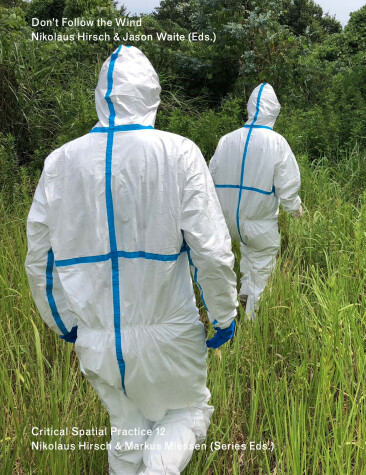Sternberg Press / Critical Spatial Practice
1 primary work
Book 12
Documenting an invisible, inaccessible exhibition within the radioactive Fukushima exclusion zone.
The twelfth volume of the Critical Spatial Practices series focuses on “Don’t Follow the Wind,” the acclaimed collaborative project situated in Fukushima’s radioactive exclusion zone. The book explores the long-term environmental crisis in the coastal Japanese region through this ongoing, inaccessible exhibition, which maintains traces of human presence amid the fallout of the March 2011 nuclear reactor meltdown that displaced entire towns. What can art do in a continuing catastrophe when destruction and contamination have made living impossible?
The exhibition is located inside the exclusion zone, an evacuated radioactive area established after the nuclear disaster that forcibly separated residents from their homes, land, and community. In cooperation with former residents, participating artists installed newly commissioned works at sites in the exclusion zone. Although the exhibition opened in March 2015, the zone is still inaccessible to the public—the exhibition, like the radiation, is virtually invisible. The exhibition can only be viewed when restrictions are lifted and people are permitted to return. This might take several years or decades—a period that could extend beyond our lifetime. While nuclear contamination has displaced and ruptured communities, new temporary and translocal formations have emerged among the residents who have lent their sites, other former residents collaborating on the project, and the artists, curators, and cultural workers.
This book includes new texts by feminist theorist Silvia Federici, art historians Noi Sawaragi and Sven Lütticken, and political philosopher Jodi Dean. The project was codeveloped and curated by the collective Don’t Follow the Wind, whose members include Chim↑Pom, Kenji Kubota, Eva & Franco Mattes, and Jason Waite. The participating artists include Ai Weiwei, Chim↑Pom, Nikolaus Hirsch & Jorge Otero-Pailos, Meiro Koizumi, Eva & Franco Mattes, Grand Guignol Mirai, Aiko Miyanaga, Ahmet Öğüt, Trevor Paglen, Taryn Simon, Nobuaki Takekawa, and Kota Takeuchi.
The twelfth volume of the Critical Spatial Practices series focuses on “Don’t Follow the Wind,” the acclaimed collaborative project situated in Fukushima’s radioactive exclusion zone. The book explores the long-term environmental crisis in the coastal Japanese region through this ongoing, inaccessible exhibition, which maintains traces of human presence amid the fallout of the March 2011 nuclear reactor meltdown that displaced entire towns. What can art do in a continuing catastrophe when destruction and contamination have made living impossible?
The exhibition is located inside the exclusion zone, an evacuated radioactive area established after the nuclear disaster that forcibly separated residents from their homes, land, and community. In cooperation with former residents, participating artists installed newly commissioned works at sites in the exclusion zone. Although the exhibition opened in March 2015, the zone is still inaccessible to the public—the exhibition, like the radiation, is virtually invisible. The exhibition can only be viewed when restrictions are lifted and people are permitted to return. This might take several years or decades—a period that could extend beyond our lifetime. While nuclear contamination has displaced and ruptured communities, new temporary and translocal formations have emerged among the residents who have lent their sites, other former residents collaborating on the project, and the artists, curators, and cultural workers.
This book includes new texts by feminist theorist Silvia Federici, art historians Noi Sawaragi and Sven Lütticken, and political philosopher Jodi Dean. The project was codeveloped and curated by the collective Don’t Follow the Wind, whose members include Chim↑Pom, Kenji Kubota, Eva & Franco Mattes, and Jason Waite. The participating artists include Ai Weiwei, Chim↑Pom, Nikolaus Hirsch & Jorge Otero-Pailos, Meiro Koizumi, Eva & Franco Mattes, Grand Guignol Mirai, Aiko Miyanaga, Ahmet Öğüt, Trevor Paglen, Taryn Simon, Nobuaki Takekawa, and Kota Takeuchi.
